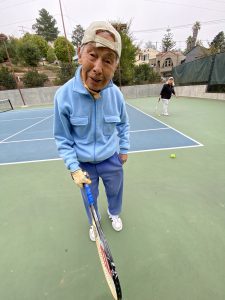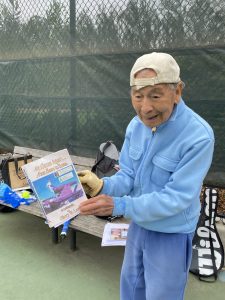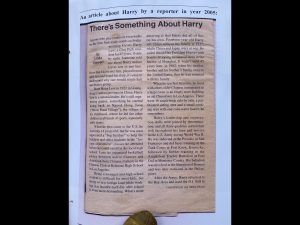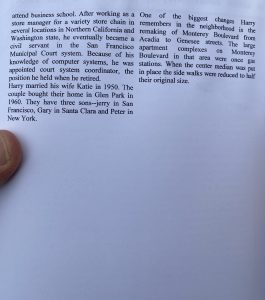The Glen Park News got a tip recently about a group of seniors who play tennis three times a week at Glen Canyon Park.
The team was organized many years ago by Harry Lew, who had lived on Monterey Boulevard since 1960 but moved to Oakland in 2017.

Lew retired in 1982 from the San Francisco City and County Municipal Court system. He started his career there as a deputy clerk and after several promotions he retired as a court systems coordinator.
In addition to tennis, he has an extensive list of other interests, such as chess, stamp and coin collecting, records, fishing, boating, puzzles, golf, football, and baseball. “But more prevalent in my life,” says Lew, “is my love affair with the game of tennis.”
Lew turned the managerial skills he’d learned on the job into organizing a seniors’ tennis group through Rec and Park at Glen Canyon and Balboa Parks. Today there are 29 active members, 12 at Glen Park and 17 at Balboa.
“We want to keep on moving, keep in good health,” he says. He also loves the team spirit and long friendships tennis has given him.
At Glen Canyon the group has a tennis court reserved Monday, Wednesday, and Friday from 10 am until noon. Lew plays on Wednesday and Friday only.
See two clips of Lew playing tennis here.
Harry Lew with teammate Michael Gregory
Harry Lew with teammate Doreen Malaspina
Lew relocated to Lake Park assisted living in Oakland in 2017 with his wife Katie, who he married in 1950. Together they had three sons who attended school in Glen Park, five grandchildren and four great-grandchildren. Katie unfortunately suffered a stroke and passed away this year.
Since moving to Oakland, Lew continues his attachment to his tennis group and the court at Glen Canyon Park. Twice a week he takes BART to the Glen Park station, then takes the 44 O’Shaughnessy bus to Elk Street, and walks the final two blocks to the court. His teammates accompany him back to BART.
He stays in shape the other days at Lake Park with ballroom dancing, line dancing, and Tai Chi.
Lew’s drive and determination are deeply embedded by the many challenges he has faced during his long life. He was born in 1922 in a village near Canton (now Guangzhou) in southern China and had a happy childhood. In 1937 at age 14 he boarded a steamship alone, headed for the US. On the way over the ship was grounded in shallow water and was bombed after getting in the middle of the war between China and Japan. He landed in Los Angeles, where he lived with a group of “old men in an old building.”
Because of the Chinese Exclusion Act enacted in 1882 by Congress, Chinese were not allowed to immigrate into the US. Lew was able to come to the US despite the law by becoming a “paper son,” whereby he was sponsored by a Chinese born US citizen, a distant relative who vouched that Lew was his son.
He was drafted in 1943 and served in the 727th Amphibian Tractor Battalion. After the war there was an amnesty allowing illegal immigrants such as paper sons to declare their true status, and Lew became a naturalized citizen.
He was subsequently awarded a special rendition of the Congressional Gold Medal honoring thousands of Chinese American veterans who served in the war. Until sometime ago the veterans’ group would have annual reunions, but now there are only three survivors.
Lew became a branch manager for National Dollar Stores in Oakland, where he met Katie. The job afforded him few benefits, little time off and variable hours, so after fifteen years, in 1963 he went to work for the City and County of San Francisco in the municipal court system.
With a regular schedule, he was able to get into his tennis togs and go down to the courts, take lessons at City College, join some tennis clubs, and play in tournaments.
When Lew retired in 1982 after nineteen years, he and Katie became cruise enthusiasts and traveled the world. “We were infected with the travel bug,” Lew joked.
“While playing the game, I always kept my cool. I never became angry or argued about the scores and calls, and always gave the opponents the benefit of the doubt on close calls. This made our time on the courts doubly pleasant,” Lew explained.
His teammates agree with Lew’s assessment.
Michael Gregory, 84, one of the original team members and Lew’s neighbor on Monterey Boulevard, describes him this way: “I’ve known Harry for a lot of years now and I’ve never seen him angry, not once. He’s the most calm, easy-going guy I’ve ever met—nothing seems to phase him. He’s always there and he’s always very supportive. In a word, he’s just a gentleman.”
John Artates, 74, lives on Chenery Street and is one of the newer members. (The Glen Park News posted a story about Artates in 2020.) He’s amazed at Lew’s keen mind. “Harry is sharp—all of us playing, we forget the score and we turn to Harry and say, ‘What’s the score Harry?’ and he tells us. And I say, how do you remember, and he says ‘Easy.’”

Much has been written about Lew, by himself and others. In 2010 he published his autobiography, “From Home to Home: An Autobiography.”



In 2005, Linda Stewart of the Glen Park News wrote a profile of Lew, giving many details of his earlier life.
On September 29, Lew’s 100th birthday, he was feted at a gala luncheon by dozens of family members and friends at a famous Chinese restaurant in Oakland, Peony’s.
At the occasion, Lew was honored by Richard Chin, a writer and the son of one of his pals, Bill Chin, who came together with Lew to the US in 1937:
For “Uncle Harry”: Your curiosity of the universe around you keeps your mind sharp, and I still can’t believe you take BART to Glen Park to play tennis every week. You are more courageous and active than me.”
For the questions on everyone’s mind, the Glen Park News asked Harry Lew his philosophy of life and the secret to his longevity. Listen to his answer here: